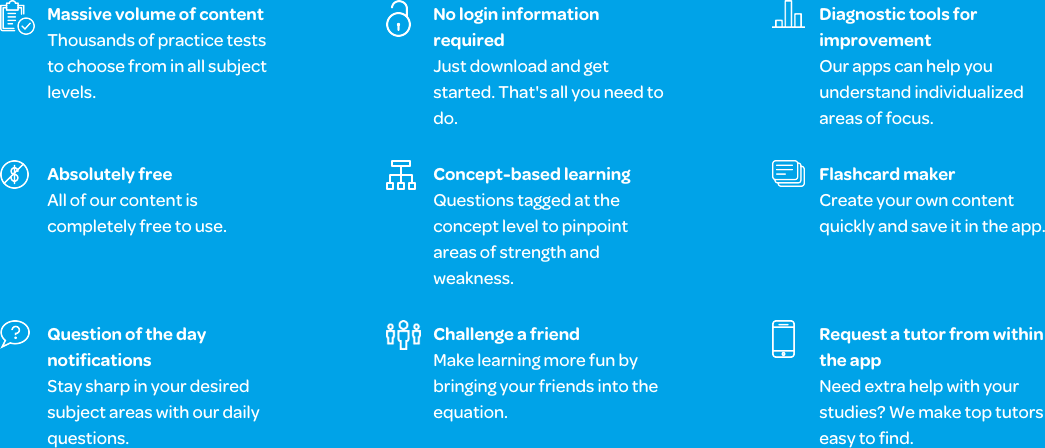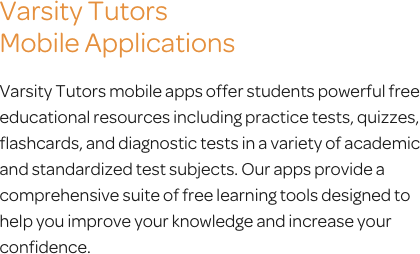The Varsity Tutors AP European History Mobile App
The AP European History exam calls on students to recall information, respond to questions, and write essays. It consists of a multiple-choice section, a short answer section, and a long essay that requires one to analyze and synthesize the data provided. Students have to recall information they’ve learned about European history and assess the importance and magnitude of specific events. Using data and evidence is part of the process, and is required to score well on the test. The free Varsity Tutors AP European History app for Android, iPhone, and iPad helps students brush up on their knowledge well ahead of test day.
During the exam, students must call on this knowledge over the 3 hours and 15 minutes allotted for completion. The exam consists of two sections, each with two parts. The exam begins with Section I: Part A, which consists of 55 multiple-choice questions that account for 40 percent of the total score. Questions are organized into sets of two to five questions covering a common theme. Students will be asked to analyze historical texts, make judgements based on presented evidence, and formulate their own interpretations from text, images, maps, and graphs. For the next 50 minutes, students are tasked with completing four short-answer questions in Section I: Part B, which provides opportunities for students to demonstrate the depth of their knowledge.
In Section II: Part A, there is a document-based question that is worth 25 percent of the total exam score. Students have 55 minutes to complete the document-based question. Section II: Part B is a long essay that students have 35 minutes to complete. They can select one of two questions and must provide explanations and analyses of major events in European history. Students must develop a cohesive argument to support their position using the historical evidence they have learned and the provided materials.
At first, it may seem like a lot to take on. Students encountering their first college-level curriculum may feel overwhelmed. Available at iTunes and the Google Play Store, the free Varsity Tutors AP European History app for Android, iPhone, and iPad provides access to myriad questions covering class concepts. These are specifically designed to help students prepare by identifying their strengths and weaknesses in advance.
Students can test themselves on concepts such as industrialization and how it affected the social class. The relationship between Martin Luther and religious thought is also something students may want to brush up on. The full-length practice tests in the Android, iPhone, and iPad app give students time to focus on many concepts. With each test, feedback is provided, so students can either see how well they did or study the explanations of answers they got wrong. They can also track their progress over time, and share it with teachers, tutors, and parents. Flashcards come in handy as well, since students can review individual concepts quickly. They can even create their own using text, audio, or photos to optimize the study experience to fit their own unique learning style.
The app helps students build up historical knowledge and their ability to analyze concepts and events. It helps to begin studying well in advance of the AP European History exam, so prospective colleges will see students in the best light possible. By getting into the habit of studying and practicing using relevant materials, students can make the most of their time. The free Varsity Tutors AP European History app, available for Android, iPhone, and iPad, is available now on iTunes and the Google Play Store.
66 mobile apps to choose from for your tutoring needs.

Learn More
If you are a high school student who enjoys learning about Western civilization, the AP European History course might be the perfect fit for you. Not only can you earn college credits by completing this course, but it could also help improve your acceptance into a relevant degree program at a top university. If you are considering majoring in history, ethnic studies, or philosophy, then this course can especially benefit you.
The AP European History course is designed to cover a number of major themes across Europe’s extensive past. As you learn important central concepts, you will be required to write analytical essays critiquing a number of themes. The purpose of the course is to provide you with a deeper understanding of Western civilization by exploring relevant texts, paintings, letters, and photographs.
The exam for AP European History is comprised of two sections. The first section is split between 55 multiple-choice questions and four short-answer questions. Section two consists of one document-based question and one essay question. You are given 105 minutes to complete the first section and 90 minutes for the second, totaling three hours and 15 minutes altogether.
When studying the AP European course, you will learn about the important socio-political movements that influenced various European societies. This includes cultural and intellectual history, political events, and economic history. Some of these important concepts include the influence of religion in Europe, the movement to secularize educational institutions, European expansion, conflicts and diplomacies, and urbanization.
One of the most important themes in European history is the Renaissance, and how it completely changed the face of Western civilization. Italy is considered to be the birthplace of this movement, where great minds rekindled an interest in the classical cultures of Rome and Ancient Greece. During this time, you will learn about greats like Niccolo Machiavelli, Michelangelo, and Leonardo da Vinci. You will also learn about the Medici family of Florence, and how their vast wealth influenced kingdoms, and even the papacy.
The Renaissance was an important time in European history. This is when peasants began revolting against aristocracy, when the Vatican’s supreme authority came into question, and when the concept of feudalism was heavily critiqued. This is also the time period when we see an emergence of parliamentary powers, modern banking, and the creation of national identities.
Additionally, you will learn about one of the most influential events in Western history, the Protestant Reformation. Here, you will explore the decline of Latin, the rise of Romance languages like French and Italian, and Martin Luther’s 95 Theses. You will also learn how this movement affected the political landscape of Europe, and how it was the source of many conflicts.
While the Renaissance was alive in Continental Europe, the English were experiencing their own cultural movements. First, there was the War of the Roses, which led to the establishment of the Tudor dynasty. Then, the Church of English was established upon the English Reformation, which resulted from King Henry VIII’s break from Rome. This time was also filled with various naval battles with the Spanish Crown, Oliver Cromwell and the English Civil War, and the emergence of Shakespeare.
Along with learning about the religious warfare that emerged from the Protestant Reformation, you will also learn about the rise of the Spanish Armada and the expeditions of Christopher Columbus. The Age of Expansion was an important time in European history, and the course material focuses on when European superpowers first discovered the New World. This is also around the same time when the concept of monarchial nation states began to truly take hold, placing nobility on the same footing as the papacy. Not only did this affect the political landscape of the time, but it began influencing the concept of culture and how it relates to a national identity.
Europe is home to a number of great scientists and thinkers, which you will learn about during the Enlightenment and Scientific Revolution periods, from Galileo’s bold claims of a heliocentric solar system to Rene Descartes’ philosophy. You will also learn about Thomas Aquinas, Sir Francis Bacon, Thomas Hobbes, and Sir Isaac Newton. Not only will you learn about their groundbreaking discoveries, but you will see how many of their theories are still relevant today.
As you dig deeper into European history, you will start focusing less on Italy and more on Great Britain and France. This is especially true during the Industrial Revolution. Not only did this event completely change the way goods were manufactured, but it also had a profound effect on culture and society. Moreover, you will also learn about the French Revolution, the emergence of a constitutional monarchy, and how we begin to look at civil and human rights.
The more you learn in European history, the easier it is to see how events shaped our modern world. This is especially true as you explore the Napoleonic Empire and learn about its expanding influence, from the Napoleonic Code to the French Invasion of Russia. Furthermore, this time period also highlights the might of the British Empire, the power vacuum after Napoleon, and revolutionary movements from the Iberian Peninsula all the way to Russia.
The end of the course begins to focus on events that you should find more familiar. This includes the creation of the Ottoman Empire, the unification of Germany and Italy, and the creation of the United Kingdom. It also covers World Wars I and II, the expansion of the Soviet Union, and the Cold War. Before you finish the course, you will learn how the fall of the Berlin Wall was a pivotal moment in not just Europe, but all over the world.
By completing this course, you will have a deeper understanding of the important events that happened in Western civilization and see how they helped shape our current societies. You should also be able to investigate and analyze various historical periods and provide informed opinions on a number of topics. Moreover, this course demands that you have the research and critical-thinking skills necessary to succeed in a college-level course.




